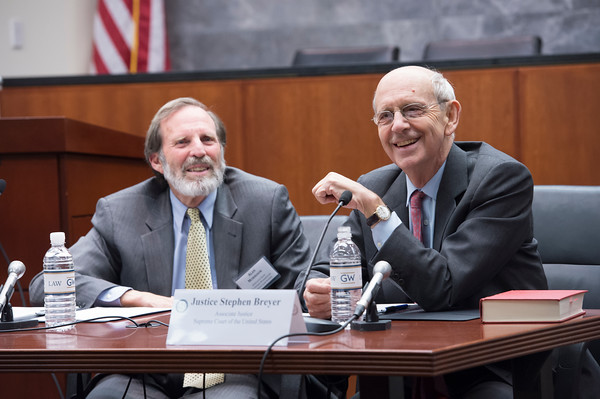Flook Says One Thing, Diehr Says Another: A Need for Housecleaning in the Law of Patentable Subject Matter
John M. Golden · November 2014 82 GEO. WASH. L. REV. 1765 (2014) In a series of recent cases, the U.S. Supreme Court has made clear that there are substantial constraints on the categories of actions and materials for which patent protection may be afforded. But the Court has not provided clear instruction on how... Read More
Court-Agency Dialogue: Article III’s Dual Nature and the Boundaries of Reviewability
Emily Hammond · October 2014 82 GEO. WASH. L. REV. ARGUENDO 171 (2014) Courts reviewing agency actions frequently offer more than a positive analysis of the agencies’ decisions. They might engage in advice-giving, for example, or temper the remedy as a way of modulating the impact of review. These actions can be used in a dialogic way, to provide... Read More
GWLR Hosts “The FTC at 100” Symposium Featuring Justice Breyer
On November 7-8, 2014, the GW Law Review held its Annual Symposium. This year’s symposium, [addlink url=”http://www.gwlr.org/2014/10/01/ftc-symposium-2014/” text=”The FTC at 100: Centennial Commemorations and Proposals for Progress”], hosted in conjunction with GW Law Professor and former FTC Chairman William E. Kovacic, not only celebrated the successes of our nation’s oldest federal regulatory agency, but also confronted... Read More
Digital Marketing, Consumer Protection, and the First Amendment: A Brief Reply to Professor Ryan Calo
David C. Vladeck · October 2014 82 GEO. WASH. L. REV. ARGUENDO 156 (2014) Professor Ryan Calo’s meticulous critique of the potential for digital marketing to manipulate consumer choice is intended to be a wake-up call to regulators, policymakers, and consumers about the dangers lurking in a digital world. His arguments are powerful and persuasive. We... Read More
The Role of Daubert in Scrutinizing Expert Testimony in Class Certification
George G. Gordon and Irene Ayzenberg-Lyman · October 2014 82 GEO. WASH. L. REV. ARGUENDO 132 (2014) Courts have substantially heightened the standard of proof for class certification motions over the last several years. In 2011, the Supreme Court in Wal-Mart Stores, Inc. v. Dukes reaffirmed that Rule 23 requires a “rigorous analysis.” That analysis... Read More
The Post-Dukes “Rigorous Analysis” and Pre-Certification
Gerson H. Smoger and David M. Arbogast · October 2014 82 GEO. WASH. L. REV. ARGUENDO 104 (2014) The Dukes “rigorous analysis” blurs the line between “certification” and “merits” discovery in class action litigation. Without adequate discovery, class counsel risk finding themselves without a sufficient record to survive appellate review of class certification orders. Class... Read More
The Rational Class: Richard Posner and Efficiency as Due Process
Elizabeth J. Cabraser · October 2014 82 GEO. WASH. L. REV. ARGUENDO 82 (2014) This Essay surveys the recent class certification decisions authored by Judge Posner, reaching the following conclusions: (1) Judge Posner has postulated a practical test for predominance and defined precisely the purpose and policy of the class action in factual terms, and (2) he... Read More
Remediation and Deterrence: The Real Requirements of the Vindication Doctrine
Jonathan W. Cuneo, Joel Davidow, and Victoria Romanenko · October 2014 82 GEO. WASH. L. REV. ARGUENDO 59 (2014) The vindication of statutory rights doctrine, first set forth by the Supreme Court almost three decades ago, has been applied by many courts in deciding whether to invalidate class action waivers located in arbitration clauses. Recently,... Read More
Three Myths About Wal-Mart Stores, Inc. v. Dukes
Theodore J. Boutrous, Jr. and Bradley J. Hamburger · October 2014 82 GEO. WASH. L. REV. ARGUENDO 45 (2014) The Supreme Court’s landmark decision in Wal-Mart Stores, Inc. v. Dukes raised the bar for plaintiffs seeking class certification and will have a significant impact on all class actions for decades to come. Some lower courts,... Read More
Applying Lessons from the Golden Age of Piracy: How to Use Specialized U.S. Tribunals to Prosecute Pirates in the Modern Era
Gregory Morrison · August 2014 82 GEO. WASH. L. REV. 1304 (2014) Maritime piracy, far from being a quaint historical relic of the eighteenth century, is alive and well in the modern world. Because of the considerable effects of piracy on international trade and security, the fight against piracy extends into the courtroom, but actual prosecutions... Read More

